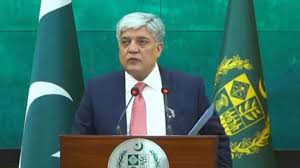PM’s climate aide stresses for public-private collaboration in green initiatives

Islamabad: Coordinator to the Prime Minister for Climate Change, Romina Khurshid Alam Friday emphasized the critical need for collaboration between the public and private sectors to address climate change and promote sustainable development.
Speaking to a three-member delegation of the Global Green Growth Institute (GGGI), Ms. Romina underscored the importance of innovative green initiatives and stressed that vulnerable countries like Pakistan urgently need access to climate funding, not loans.
She highlighted the severe impacts of climate change on Pakistan, which is already facing devastating consequences such as flooding, droughts, and water scarcity. As the country grapples with these issues, the need for sustainable, climate-resilient solutions has become more urgent than ever and reaffirming Pakistan’s commitment to fighting climate change and working with international partners to find practical solutions for a greener, more sustainable future.
Ms. Romina comments come as part of a broader call for strengthened collaboration between government, industry, and international organizations to address environmental challenges. She emphasized that the private sector has a vital role to play in driving investment and developing green technologies, and that governments must provide the regulatory frameworks and incentives to encourage this participation.
The meeting with the GGGI delegation also focused on the potential for joint projects to address key environmental issues, including renewable energy, water management, and the recycling of water.
She stressed the importance of prioritizing water conservation and management, highlighting that water scarcity is one of the most pressing challenges facing Pakistan. She called for the development of solutions that not only address the immediate water needs but also promote long-term sustainability by improving water-use efficiency and expanding access to clean water.
“Water is a priority issue for Pakistan, and we need to collaborate on innovative solutions that focus on efficient water management, water recycling, and the protection of our watersheds. Renewable energy, too, is at the forefront of our green transition. By working with organizations like GGGI, we can develop sustainable energy solutions that help reduce our reliance on fossil fuels and mitigate the impacts of climate change,” she remarked.
In the meeting, both parties discussed potential collaborative efforts between the Pakistani government and the Global Green Growth Institute, with an emphasis on launching projects that address the country’s water and energy challenges while ensuring that these solutions are sustainable, scalable, and resilient to future climate shocks.
Secretary of the Ministry of Climate Change, Aisha Humera Moriani highlighted the government’s initiatives to encourage the adoption of electric vehicles.
She emphasized that the government is considering offering auto loans to facilitate the transition to renewable energy, particularly focusing on the growing demand for electric two-wheelers across the country.
Aisha Moriani outlined the importance of supporting sustainable transportation solutions as part of the national effort to reduce carbon emissions. “We are working towards a circular economy,” she said, stressing the need for sustainable practices that minimize waste and maximize resource efficiency.
She suggested that GGGI could play a pivotal role in addressing water management challenges in Balochistan and Sindh, while also supporting Punjab’s efforts in solid waste management. These initiatives aim to create a more sustainable future by aligning policy strategies with climate-resilient development goals.





